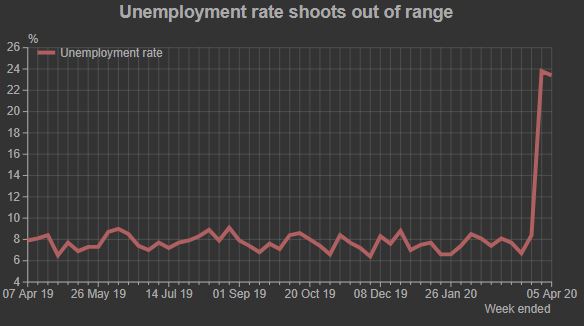Hyderabad: As India moved into the lockdown period after the outbreak of the Covid-19 pandemic, temporarily shutting down manufacturing facilities and plants across the country, joblessness rate has spiked in the first week of April 2020.
The Centre for Monitoring Indian Economy (CMIE), an independent think tank, on Tuesday said that the unemployment rate during this last week was a whopping 23.4%.

But data collected by CMIE show that situation had started turning grim last month itself, as India recorded an unemployment rate of 8.7% in March – the highest in 43 months and also 98 basis points higher than the unemployment rate in February 2020, the largest monthly increase recorded ever.
Mahesh Vyas, Managing Director and CEO of CMIE, said: “We had feared a fall in labour participation rate because of the national shutdown to contain the spread of coronavirus. But this fall seems to have happened even before the lockdown. Of course, it gets much worse as we move into the lockdown.”
The rising rate of unemployment has anyways been a matter of concern for some time now, even before the coronavirus outbreak hit the country. To recall, as per the last set of official data released by the statistics ministry on employment, India’s unemployment rate had risen to 6.1% in 2017-18, confirming a media report that had first said in January 2019 that joblessness has hit the highest level in the country in at least 45 years.
Employment Rate & Labour Participation Rate
The situation has only worsened now, with CMIE data showing that employment rate in India has now fallen to an all-time low of 38.2% in March 2020. The employment rate is a statistical ratio that measures the proportion of the country’s working age population that is employed. CMIE noted that the fall in the employment rate since January 2020 has been particularly steep after having struggled to remain stable over the past two years.
The labour participation rate, or the number of people available for work as a percentage of the total population, fell to 41.9% in in March 2020 compared with 42.6% in February and 42.7% in March 2019.
Read more:Fight against COVID-19: RBI gives more freedom to cash starved states to plan their expenditure
CMIE attributed the fall in India’s labour participation rate bin March to a sharp 9 million fall in the labour force -- from 443 million in January 2020 to 434 million in March 2020.
Importantly, for the first week of April, India’s labour participation rate stood at a scarier 36%, while the employment rate slipped to 27.7%.
India had recently witnessed large scale exodus of labourers working in the cities to their respective hometowns after Prime Minister Narendra Modi announced a 21-day national lockdown starting with effect from 25 March 2020. Anticipating an extended lockdown and a prolonged recovery phase for activities to turn normal, migrant workers and daily wage labourers made their way back as they feared losing jobs.



